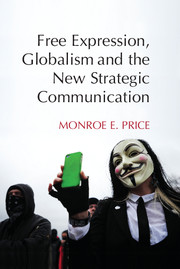Book contents
- Frontmatter
- Contents
- Acknowledgments
- 1 Moving the Needle, Filling the Streets
- 2 Strategic Communication and the Foundations of Free Expression
- 3 Narratives of Legitimacy
- 4 Strategies of the Diagnostic
- 5 Asymmetries and Strategic Communication
- 6 Strategies of System Architecture
- 7 Soft Power, Soft War
- 8 Religions and Strategic Communication
- 9 Regulating NGOs in the Market for Loyalties
- 10 Strategic Platforms
- 11 Strategic Communication and Satellite Channels
- 12 Strategies of Closure, Markers of Anxiety
- Bibliography
- Index
- References
12 - Strategies of Closure, Markers of Anxiety
Published online by Cambridge University Press: 18 December 2014
- Frontmatter
- Contents
- Acknowledgments
- 1 Moving the Needle, Filling the Streets
- 2 Strategic Communication and the Foundations of Free Expression
- 3 Narratives of Legitimacy
- 4 Strategies of the Diagnostic
- 5 Asymmetries and Strategic Communication
- 6 Strategies of System Architecture
- 7 Soft Power, Soft War
- 8 Religions and Strategic Communication
- 9 Regulating NGOs in the Market for Loyalties
- 10 Strategic Platforms
- 11 Strategic Communication and Satellite Channels
- 12 Strategies of Closure, Markers of Anxiety
- Bibliography
- Index
- References
Summary
I have titled this book Free Expression, Globalism and the New Strategic Communication. But what, in the end, is “new” about this process, or put differently, what is significantly new? Mass efforts at persuasion are hardly unknown, nor is assiduous use of whatever technology becomes newly available. What differentiates the present is an accumulation of factors. Newness resides in a combination of elements, including global scale, the multi-polarity of clashing narratives and the extraordinary nature of the technology that strategic communicators can exploit. Among these are novel combinations of techniques that ambitious communicators deploy in advancing their objectives: strategic diagnostics, strategic narratives and the building of strategic architectures. Current embodiments of strategic communication are also “new” because of the explosion of data available for analysis and because of the social media techniques for instrumentalizing that data. Dizzying and confounding asymmetries give rise to sudden ascendancies for newly coined or long-suppressed viewpoints.
And there is one additional level of newness, not new as in unheralded, but new in application and intensity. Given the sharply competing innovations for the media and communications infrastructure, there is intense competition for Daniel McCarthy and others “technological closure.” Closure is a prize because, if and when it occurs, what was subject to debate becomes accepted as a norm. Technological closure exists when, in McCarthy’s phrase, the innovation or process “no longer strikes its users as interesting or novel.” In this sense, obtaining closure can be the highest challenge to strategic communicators. It is, in a sense, acceptance of the strategy itself. Strategic communicators seek closure around ideas of freedom of expression, around ideas of history and legitimacy, and, of course, over the deployment of the technologies themselves.
- Type
- Chapter
- Information
- Free Expression, Globalism, and the New Strategic Communication , pp. 239 - 254Publisher: Cambridge University PressPrint publication year: 2014



